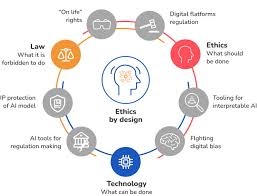In an era defined by rapid technological advancement, artificial intelligence (AI) and data science are reshaping industries, economies, and societal norms at an unprecedented pace. The digital transformation spurred by AI-driven innovations introduces transformative potential and profound ethical implications. This article explores the multi-faceted dimensions of AI and data ethics in the context of digital transformation, discussing ethical frameworks, regulatory requirements, societal implications, and the crucial role of corporate governance. Drawing on a range of interdisciplinary perspectives, we outline the complex ethical considerations arising from AI applications and emphasise the need for a collaborative approach to ensure responsible, fair, and transparent AI deployment.
The integration of AI technologies into modern organisations is integral to digital transformation, improving decision-making, optimising processes, and enhancing consumer experiences. However, the powerful capabilities of AI bring a host of ethical dilemmas, especially concerning data privacy, algorithmic bias, accountability, transparency, and long-term societal impact. In this landscape, AI and data ethics are essential to address emerging ethical issues and align technological progress with human-centered values.
Foundations of AI and Data Ethics
AI ethics is grounded in interdisciplinary concepts, blending principles from philosophy, law, data science, and social sciences. Core ethical frameworks relevant to AI include:
- Consequentialism: Evaluating the ethicality of AI based on its outcomes, emphasising the benefits and harms.
- Deontology: Focusing on rules and duties, suggesting that AI must operate within pre-set ethical guidelines regardless of outcomes.
- Virtue Ethics: Focusing on the moral character of those developing and deploying AI systems.
- Human Rights: Asserting that AI should align with human rights, especially in areas like privacy, autonomy, and equity.
Data ethics, in tandem, concerns the responsible collection, processing, and analysis of data. Key data ethical principles involve transparency, consent, data security, and minimisation of harm.
Ethical Challenges in AI and Data-Driven Transformation
The application of AI technologies and the handling of vast data volumes raise several ethical concerns:
- Data Privacy and Consent
Data privacy is foundational in AI ethics, with GDPR and CCPA as prominent regulations setting the global standards. However, data collection often involves complexities such as informed consent, data anonymisation, and secondary data usage. Challenges arise in balancing the utility of data with respect to user privacy, especially as companies leverage AI for personalised experiences. - Algorithmic Bias and Fairness
Algorithmic bias, often a byproduct of biased datasets or training processes, can lead to discriminatory outcomes in AI applications. This is particularly critical in areas like hiring, credit scoring, and law enforcement, where bias can reinforce existing inequalities. Addressing bias requires an approach that prioritises fairness in data sourcing, algorithm design, and continual auditing. - Accountability and Transparency
The “black box” nature of many AI systems creates a gap in understanding how algorithms reach specific decisions, complicating accountability. As AI decisions impact human lives, transparency becomes essential to build trust, and ensure that outcomes are justifiable and explainable. Interpretability methods, such as explainable AI (XAI), are crucial to address these issues. - Autonomous Decision-Making
The ethical implications of AI-driven decision-making, especially in sensitive sectors such as healthcare, finance, and autonomous driving, are profound. Autonomous decision-making poses risks of unintended consequences, raising the need for well-defined ethical guidelines that ensure AI systems are safe, reliable, and aligned with societal values. - Surveillance and Social Manipulation
AI-powered surveillance technologies, particularly facial recognition and behavioral analysis, have raised concerns around personal freedom and autonomy. Surveillance presents an ethical paradox between ensuring security and maintaining privacy. Additionally, AI can be exploited for manipulation, as seen in algorithmic amplification of disinformation on social media platforms, impacting democratic processes and public opinion. - Long-Term Societal Impact
Beyond immediate ethical issues, the long-term societal impact of AI-driven transformation includes questions about employment displacement, economic inequality, and the influence on social structures. Policies are needed to ensure that digital transformation enhances societal welfare and does not exacerbate socio-economic divides.
AI and data ethics are critical in ensuring that digital transformation benefits society equitably and responsibly. Organisations adopting AI must navigate complex ethical challenges, such as ensuring data privacy, minimising bias, and upholding accountability. Ethical AI frameworks, tools, and techniques—coupled with robust governance and regulatory compliance—form a strong foundation for responsible AI practices.
As digital transformation accelerates, a collaborative approach among governments, corporations, researchers, and civil society will be vital to guide ethical AI development. By aligning AI systems with human-centered values, society can harness AI’s potential to drive progress while safeguarding fundamental rights and social equity.







